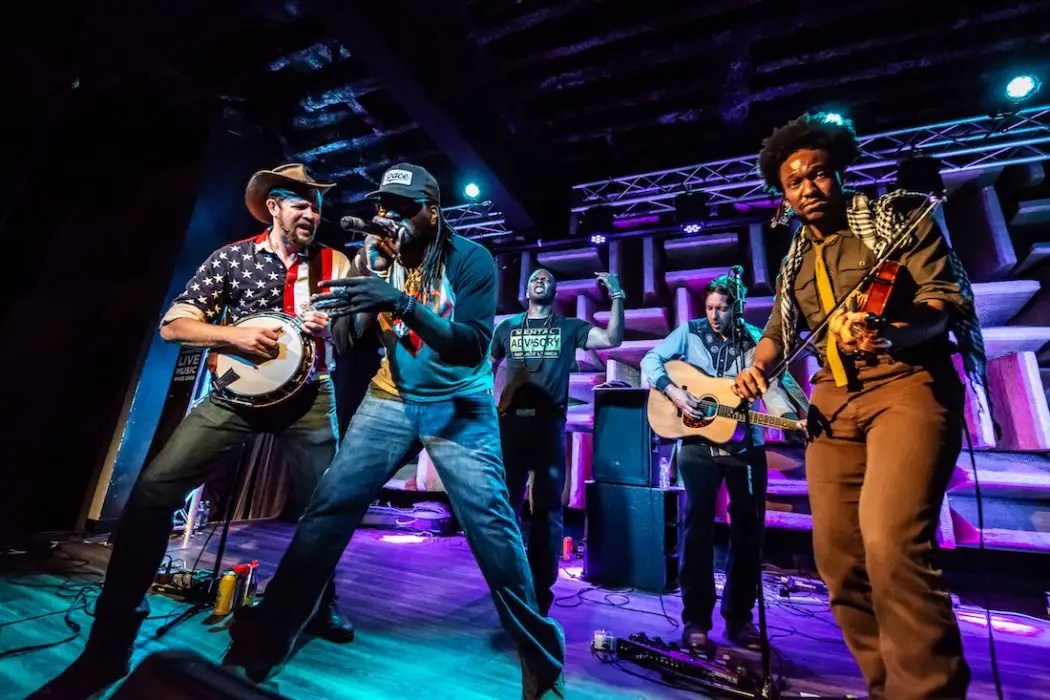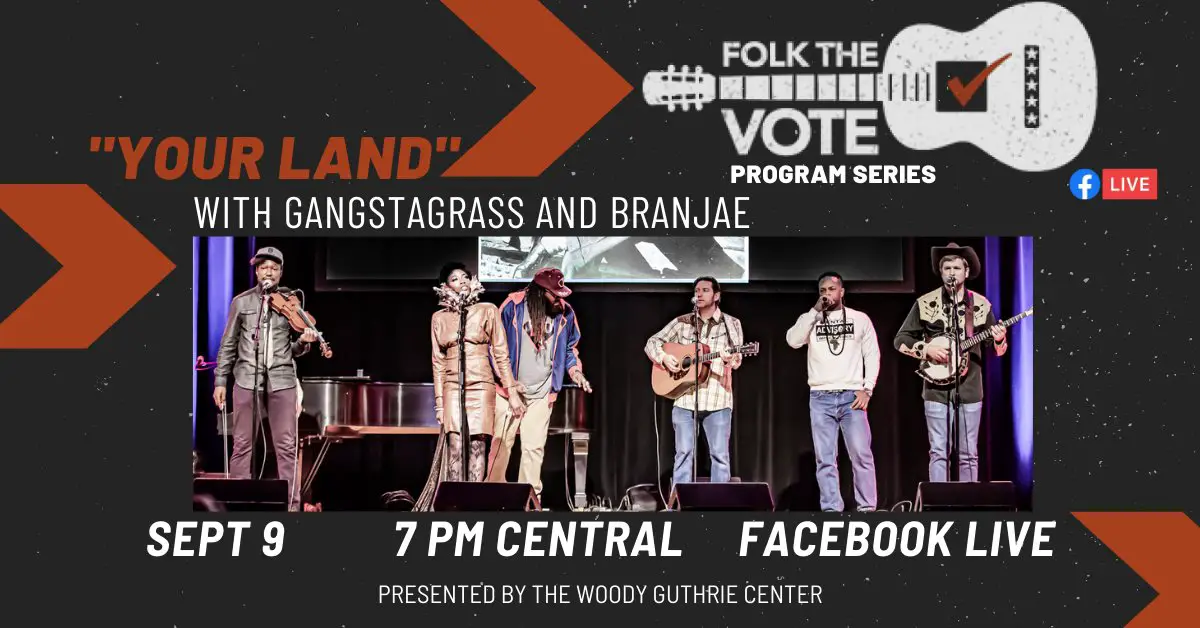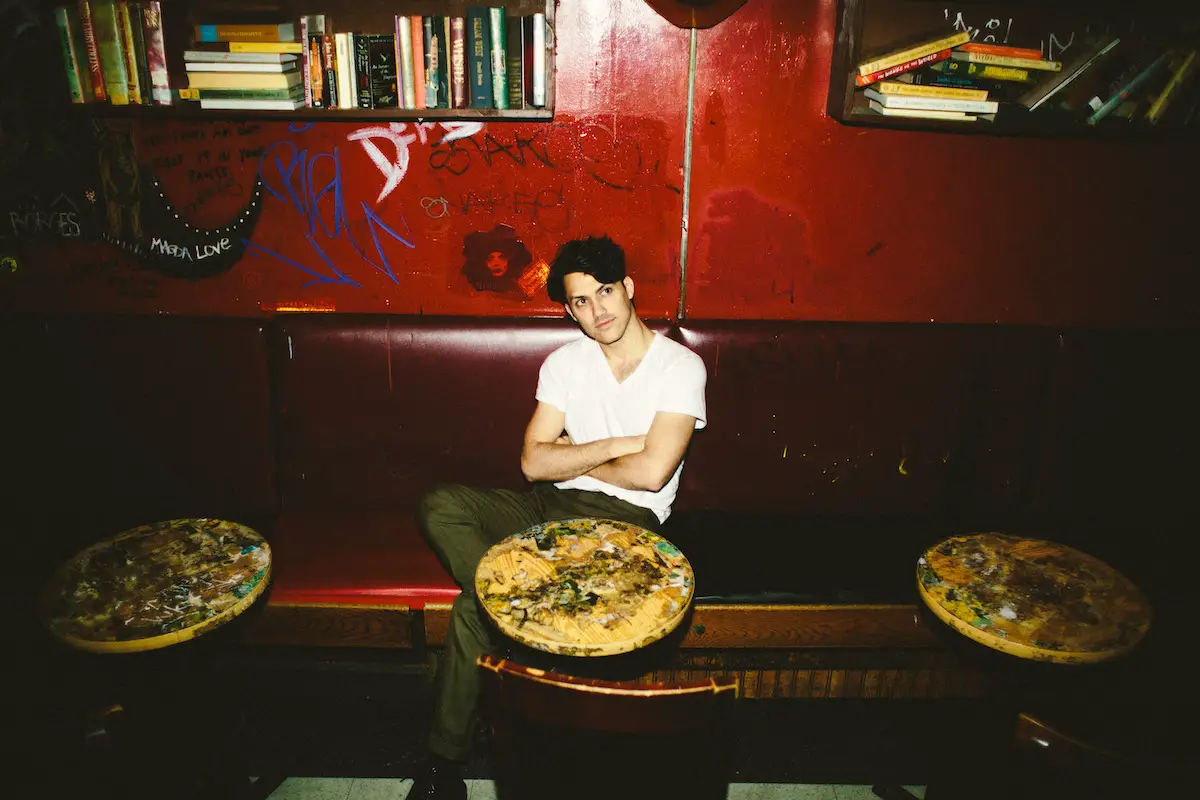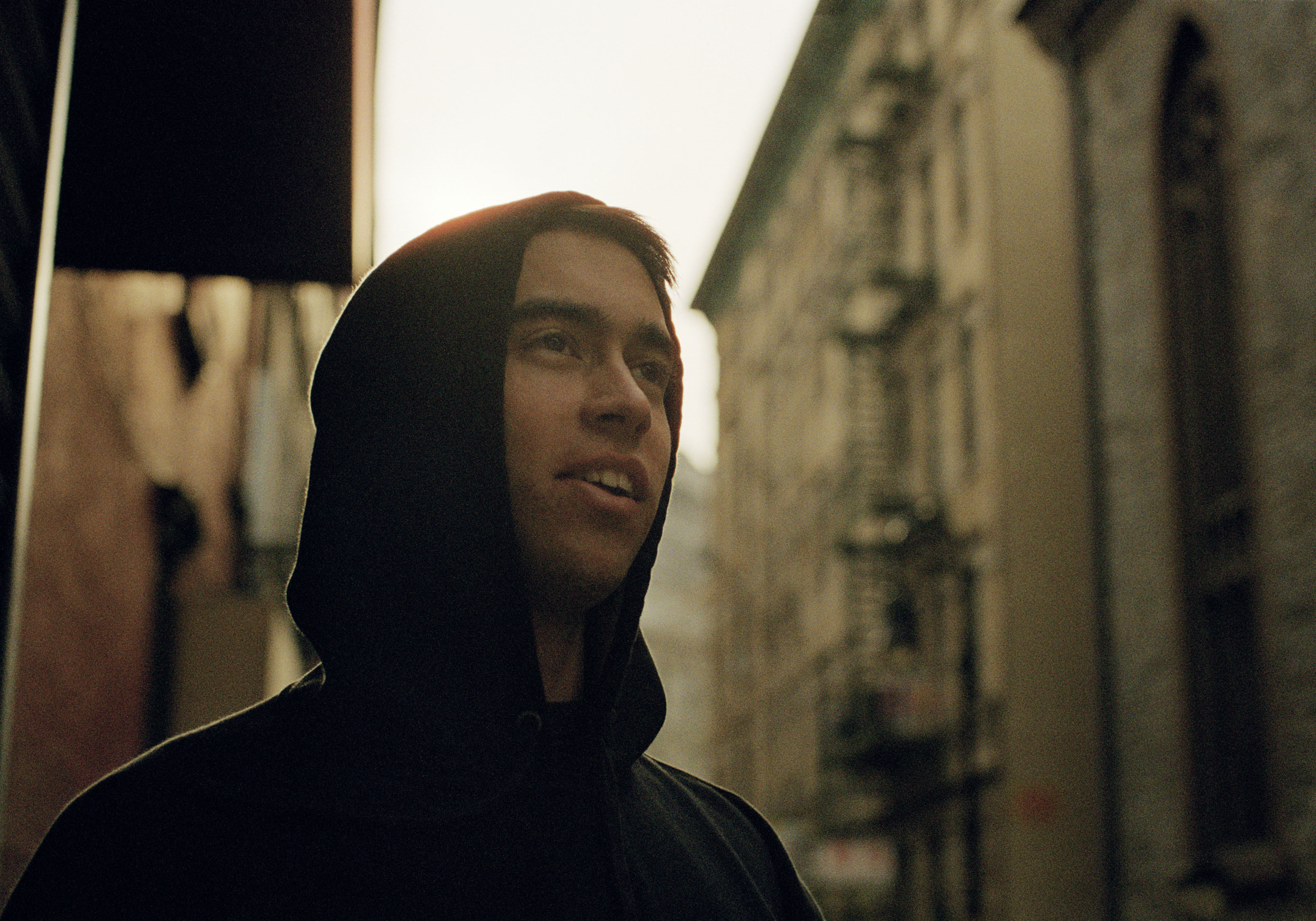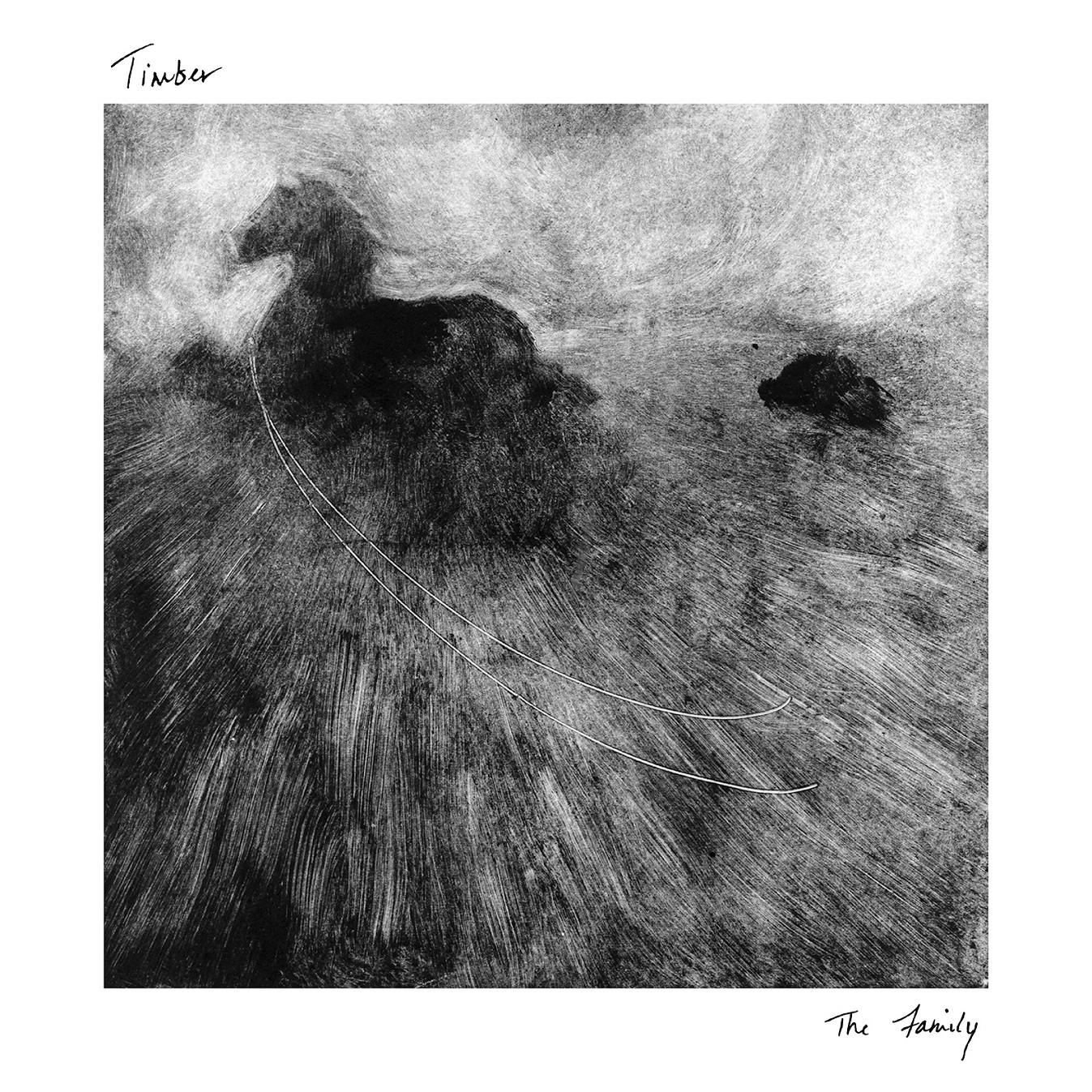East Coast supergroup Gangstagrass create a shared culture for dialogue and activism on their new album ‘No Time for Enemies’. The message embedded in their spellbinding music represents a day-to-day mission to push forward in the face of injustice.
Stream: “Ride with You” – Gangstagrass
If there’s one one word embedded within the very concept of 2020, it would be hopelessness. Watching people refuse to simply wear a mask as the United States death toll for COVID-19 exceeds 180,000; that’s hopelessness. Watching another police officer shoot a Black man after months of encouraging protests; that’s hopelessness. Witnessing a streak of notable deaths from natural causes; that’s hopelessness. Human nature tells us that no other word can properly describe this feeling. We’re too tired to even try.
Thankfully, human nature also bounds us to ever-changing moods. Our hopelessness turns to an awakening, our awakening to anger. When we reach that pinnacle, we’re ready to make a change (even if it is long overdue). I personally haven’t traveled around the country, but I have witnessed certain bouts of action in my home state Massachusetts. I’ve seen friends and family members finally understand the importance of voting. I’ve seen people call others out for not wearing a mask in public. And most importantly, I’ve seen more grassroots protests than ever before. These are all steps int e right direction, even if certain moments of bleakness loom over our heads like one of those aggravating rain clouds you see in TV shows.
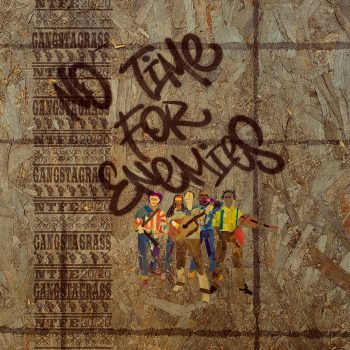
Brooklyn-based supergroup Gangstagrass embodies a reason to push forward despite consistent letdowns. The multi-racial collective – consisting of Rench, Dan Whitener, Brian Farrow, R-Son The Voice of Reason, and Dolio The Sleuth – continue to sharpen their inexhaustible blend of bluegrass, hip hop, electro pop, and country on their newest album No Time For Enemies.
The project has been released during an essential time in our country’s history, and the music reflects that. Their balance of styles, which seems unconquerable on paper, deftly intertwines to create this urgently universal uprising. Even as quarantine forced the band to finish the album over email and FaceTime, Gangstagrass have never sounded so united. Songs like “Freedom,” “Ain’t No Crime,” and “Nickel and Dime Blues” showcase the group’s topical versatility, as they tackle anywhere from the economic despair found in the United States, to racial boundaries that continuously prove to be menacingly timeless.
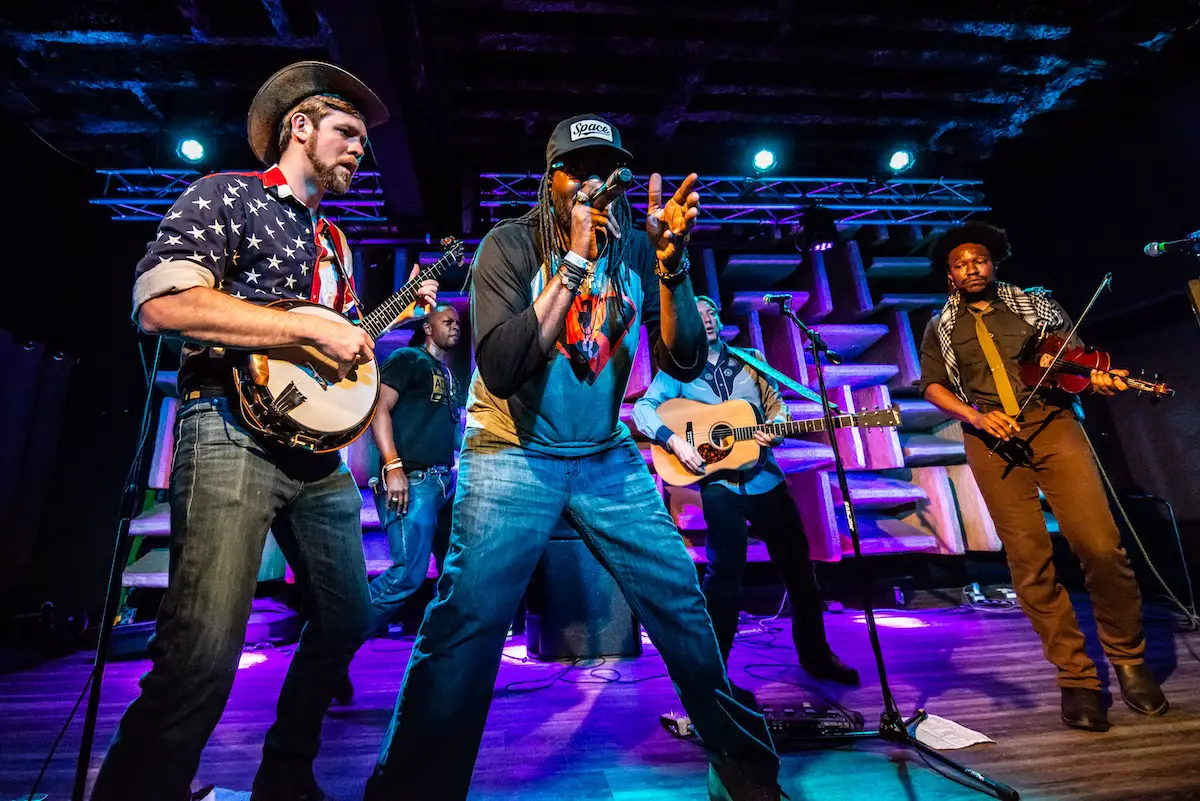
Gangstagrass are also participating in a Voter Registration Initiative, coupled with an interview that will be happening on September 9.
“We’ve been big on voting for a while as an entity and as individuals and so the opportunity with Oxfam is a chance for us to really spread that mantra out a little bit wider,” R-Son tells Atwood Magazine during our email exchange.
On top of that, the group is also holding a virtual performance at MONDO, which is a music and tech conference during the month of October. Through these events alone, Gangstagrass hope to provide a light at the end of the tunnel, and emphasize the blood, sweat and tears put in by people who’ve fought and died for equality in this country. Voting is an excellent next step for action. Change won’t happen overnight, but at the very least, our hopelessness will wither away.
Atwood Magazine was proud to speak to the band about their new album, instilling change in the community, and how they were able to develop their artistry as individuals during quarantine. Their single “Ride With You” has well over 200,000 streams at the moment. Watch the video to that (embedded in the article), and stream No Time For Enemies on all platforms.
link to September 9, 2020 event: link here
A CONVERSATION WITH GANGSTAGRASS
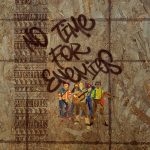
Atwood Magazine: What you all have done is wholly unique and essential to music, so I’m curious to know how you guys met/decided to make songs together? Was it difficult to mesh these differing styles together at first?
R-SON: Meshing the styles wasn’t very difficult because the two musics, while sonically different, come from similar places in American society. When you have people just making music with what they have, be that fiddles and banjos or turntables and microphones a lot of it winds up being more similar than different.
Rench: That’s true – one example is how bluegrass and hip-hop had pretty much the same use of improvisation elements, bluegrass pickers soloing or hip-hop MCs freestyling, they really shared that. I got the band together by finding the kind of musicians that can tap into that.
The press release noted how No Time For Enemies is your most collaborative album to date. How different is this album compared to the last four projects?
R-SON: The difference with this album comes in a couple different ways. For the most part with the earlier stuff it was mostly Rench putting together the songs and most of the choruses and hooks and the rest of us just sort of adding onto that particular song. Whereas on this album a lot of it was built while we were together on tour and then a good portion of it while we were all quarantined in our various homes creating the songs and putting them together and then sending it all to Rench to assemble. You can tell the difference in a lot of the contextual manner more than some of the older stuff. Freedom, for example, was a song that we all sort of built together off of a fiddle lick that Brian Farrow was playing in rehearsal one day back in 2019 and we just sort of built off of that and created the song instantly — before a lot of the things that sort of broke out through this year had even started.
Obviously the way of recording the album had to change once social distancing measures were implemented, but I’m curious to know if the artistic direction changed at all because of COVID?
R-SON: The artistic direction didn’t really change. We were sort of in a mood already to create something that stood out and really caught the vibe of Freedom. We had started that song before the quarantine began so it was something that really felt like a core of the album so we had to really work around that. We have been doing stuff in that vein anyway: Nickel and Dime Blues was in a similar vein just really talkin’ about people’s lives and the things in people’s lives that we all had in common. The one thing that really jumped out was the album title which we hadn’t really thought up at the time and then right as the quarantine began it was just something I happen to have said on a livestream that we were doing and it stuck. Danjo was like yeah that’s it, that’s the album title so…
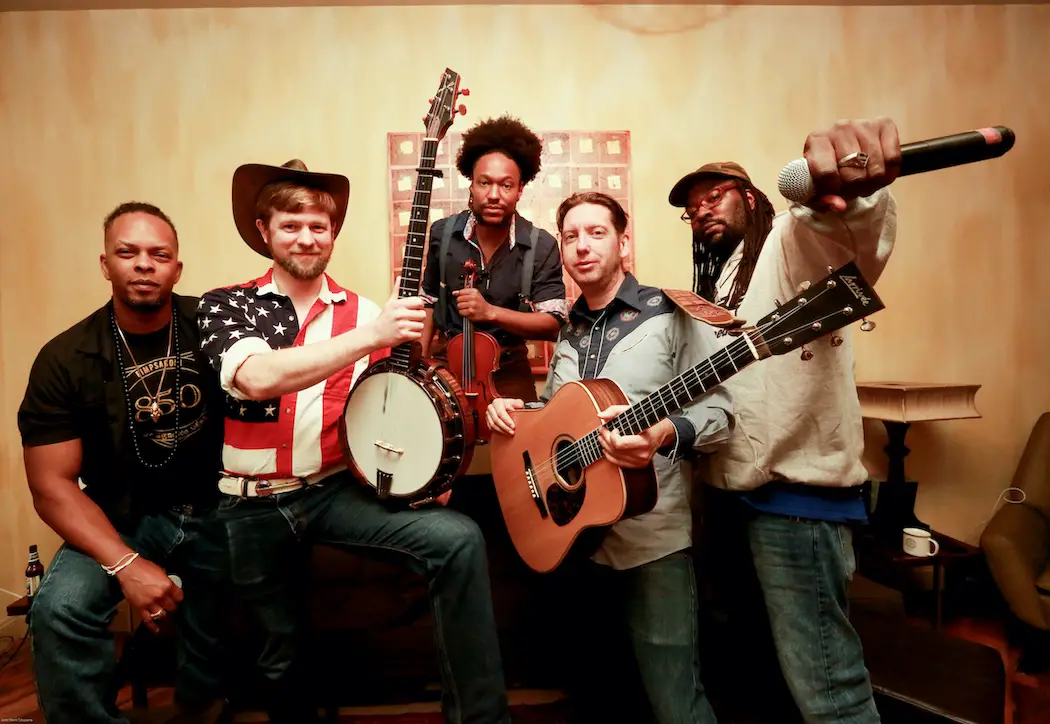
What difficulties (if any) did you guys experience while recording remotely? I know you guys would send some track ideas to Rench, but how were you able to cohesively finish the album from home?
R-SON: The only one that had any problems recording remotely was me. The entire rest of the team all had home studio stuff to record with and I didn’t and so Rench and some of our supporters helped get together all the stuff that I needed. I had a microphone that I had gotten from Ear Trumpet Labs last year but that was it until they sent me the hardware that I needed and a laptop. Dan helped me through how to record and everything like that but yeah everybody else was good to go; I was the only one with no recording equipment.
Rench: Luckily we had at least mostly written the tracks and so we were able to record based on what we had done in rehearsals before lockdown. Even so, I had the chance to plug in some of my talent at production from a hip-hop style where you can edit and craft tracks together from different sources. The hip-hop aspect of this was a real asset there.
How did quarantine affect each of your individual talents? Were there aspects of your artistry that you were able to tap into outside of the group?
R-SON: For me personally I made an effort to not use the words quarantine, covid-19 or corona this year and I still haven’t and because most of the album wasn’t very specific to those. I think just being by myself writing and vibing off of stuff as it was coming in as I was hearing it made it a little bit more challenging because I didn’t have anybody to bounce it off of it immediately. It was just record it, send it, and then hope that everybody was digging it, which worked out.
Rench: Yeah, it was a hurdle for us to be recording in isolation — we had really planned on being all together for recording to be able to play off each other and tap into how we play as a group. But everyone stepped up. And the production end is where my talent lies so that still played to a strength we could tap into.
One of my favorite songs from the album is “Nickel and Dime Blues,” because I think it captures the cyclical hardships of living poor really well (and how unfair incarceration is usually the result). What was the inspiration behind this particular track?
R-SON: Nickel and Dime Blues is a Dan Whitener original. He came to us with the verses in that and the hook and had most of it put together. Dolio and I just put our verses on it. We’d been performing that song for more than a year by the time we actually recorded it. But that was all Dan — that was his baby and some stuff he had been thinking about about being broke and how brokeness sort of exists as a strong theme in both of the cultures that we get our music from. There’s a great story about Mountain Dew in that about how Mountain Dew was a name they used to call moonshine and that’s where they got the name of the soda. So it fits in a lot of different ways and in all the realms that we exist in and lots of folks in those realms are broke.
What are your musical inspirations (specifically for this album)?
R-SON: There wasn’t anything specific about this album more than any other, in the beginning. When covid-19 hit and we were forced into quarantine and the movement started (continued, I should say) some of the writing became a bit of a natural progression towards what we thought the world needed to affect positive change.
Rench: I love the fact that there was no overarching thing we were trying to emulate with the album, it’s 100% following our own path. For each song you could certainly trace some different inspirations but we drew on different inspirations for each song so it’s got a nice variety to it. Like Outkast energy for “Aint No Crime” or Earl Scruggs style for the banjo part and classic spirituals for the hook on “Freedom” etc.
It’s great to see a revolution happening in this country (though it’s way overdue) following the death of George Floyd. However, I do think some people forget that this is a movement, and it doesn’t end with a couple social media posts. One thing I admire about you guys is your tendency to educate listeners on the past, and draw consistencies between racial division from years ago and what’s happening now. How important was it to show this lineage on “Freedom,” especially in 2020?
R-SON: Well like I said Freedom was already written and was already recorded by the time everything happened with George and stuff started to pop off in Minneapolis and all over the rest of the country. We hadn’t really considered it being not only the first on the album but doing a video for it and then when everything started to happen there was no way we couldn’t. I reached out to a friend of mine that was doing some graphic design and making videos and we put the whole video together in about two weeks so we could release it on Juneteenth but the song had already been recorded back in February. We had started putting that together last year and it was just one of those things where it sort of had to be made and then the space for it to fit just sort of appeared unfortunately in the midst of everything that was going on.
Tell me a little bit about the Voter Registration Initiative through OXFAM.
R-SON: We’ve been big on voting for a while as an entity and as individuals and so the opportunity with Oxfam is a chance for us to really spread that mantra out a little bit wider. The idea that, particularly for me, people that look like me fought and bled and died for the right to vote, to not do it is a bit of an affront to them and so we really have to make sure that we get that idea out and make sure we use it! And we’ll put whatever effort that we can into getting that idea out.
Rench: It’s true — we’ve been shouting out the importance of registering and voting (as one necessary ingredient among many needed to create change) for months already, so when the opportunity to plug into a specific program that helps people spread the word came up we were really glad to be putting a tool out there. Having someone you know send you reminders about registering and voting greatly increases the chances you will do it, and this program sets people up to have automated reminders and plug their friends in. To everyone reading this: plug in with us and join our team by texting “GTHEVOTE” to 97779.
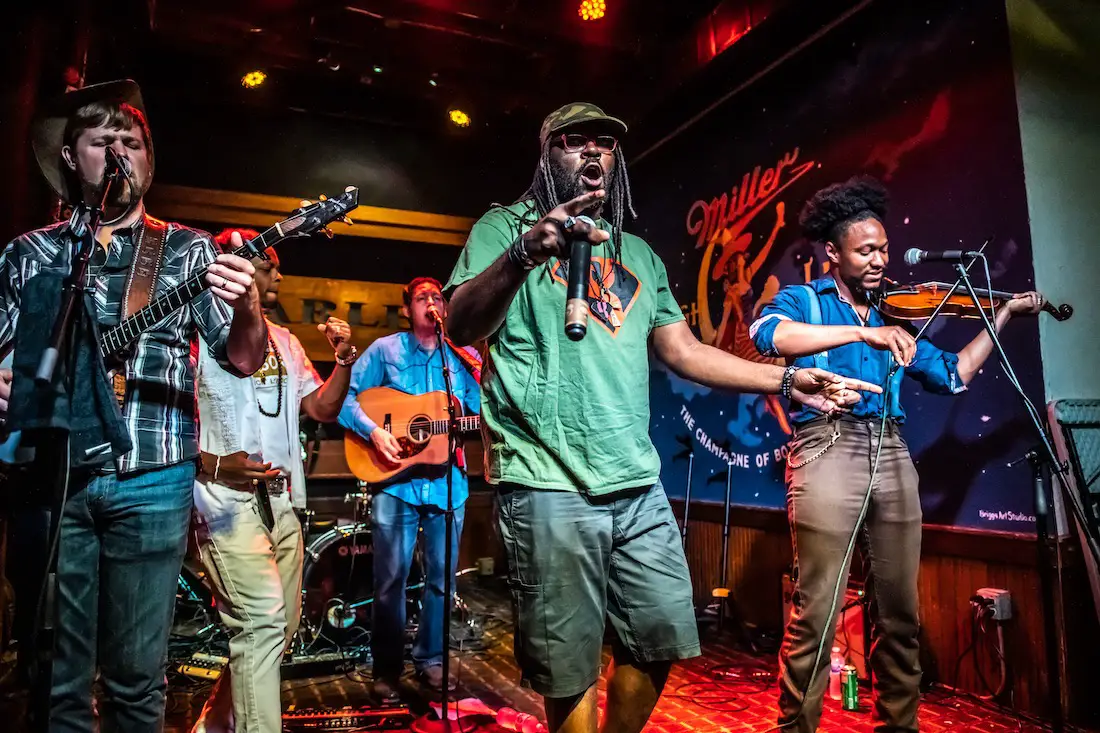
How important is it to perform at MONDO on the eve of the election? Is there a deeper message you guys want to get across during that performance?
Rench: First we need all hands on deck to keep our democracy going by getting the votes in. We do believe that this election is one key chance to turn away from authoritarian, selfish policies, even though we know the fight will continue afterward. We are going through a challenging time; the big message is ride through it with us and don’t let your fear turn you to violence, see the opportunity for all of us together to come out of this wiser and stronger.
The press release said that you guys collaborated with Chicago-based artist Faheem Majeed. What types of projects are you working on with him?
Rench: We had him design the album cover, and we are super proud of how it came out.
R-SON: We started working with him because we had heard he was doing some really cool stuff with the oriented strand board that was going up on a lot of windows of businesses all over the country when there was concern about riots happening and such and the material just sort of made that statement of what was going on this year. We really wanted to start with that, then he had designed the images of us in the different colors of wood. I chatted with him about how we wanted to do what’s usually the stamp part of the wood with our name and logo and then the actual album title in a graffiti font so it looked like something that could have been up somewhere and then somebody tagged the title on it. It serves as a remembrance of the times and what was going on as we were in the process of making the album. Faheem did an amazing job. We really really love the whole thing.
As I mentioned in my prior piece about “Aint No Crime,” the industry tends to put artists in specific boxes (the Grammys loves to do this), which can oftentimes lead to this musical segregation. What changes do you guys think should be made in the music business in order to properly avoid this type of restriction?
R-SON: We’ve been talking about that for the last few years. The unfortunate part about it is that genre is so ingrained in the industry right now it’s really hard to get people out of it. And it’s hard to get people into something that they don’t think is already certainly prescribed for them. What we’ve been doing is just taking the best of the two musical cultures that we’re most ingrained in and really just trying to make the best with them. That’s not to say we don’t know anything else — I’m a huge classic rock and grunge guy and Dan does remixes and Brian is really really deep into a lot of old timey stuff, so we run the gamut of musical tastes and styles. It’s just we know we’ve chosen the two musical styles that we kind of embody the most to make our music but that doesn’t say that that’s all we’re about. I think once people start figuring out that all of our musical tastes are broader than what the charts tell us they are, that’ll make it a little bit easier for the disintegration of genre while still recognizing the different musical types and traditions.
Rench: One important thing that’s already being promoted by us and great artists like Rhiannon Giddens and Dom Flemons is to acknowledge that our concept of genres in America is bound up with segregation and erasing the mixed roots our genres, because the record industry was started during Jim Crow and its approach to Southern music in particular was to sell to segregated audiences by pretending there was white southern music and black southern music — this was a fabrication that took hold in our imaginations for generations. So first we have to recognize that our musical categories have been twisted like that and then we can understand better how to let go of that illusion and embrace the amazing tapestry of American music that defies all our preconceptions.
— — — —

Connect to Gangstagrass on
Facebook, Twitter, Instagram
Discover new music on Atwood Magazine
? © Melodie Yvonne
:: Stream Gangstagrass ::

